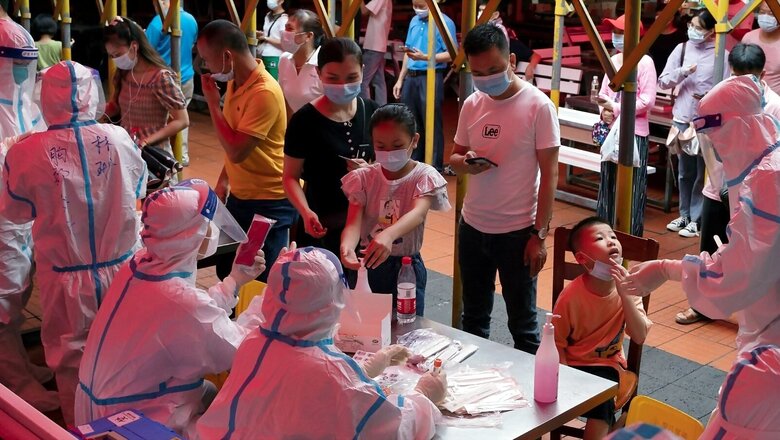
views
China reported on Wednesday the most new locally transmitted COVID-19 cases since January as some cities stepped up restrictions, cut flights and increased testing to get to grips with an outbreak driven mainly by the Delta variant. The travel restrictions and closures led Nomura to downgrade its July-September growth forecast for the world’s second-largest economy, as well as its full-year prediction, saying China’s zero-tolerance approach to the virus was becoming increasingly costly.
“The draconian measures taken by the government are resulting in potentially the most stringent travel bans and lockdowns in China since the spring of 2020,” the brokerage said in a note.
The coronavirus first emerged in late 2019 in the city of Wuhan in central Hubei province, but until recently, China had largely managed to keep infections imported from abroad from sparking major local outbreaks.
Since late July, however, the highly transmissible Delta variant has been detected in more than a dozen Chinese cities, including the capital.
The initial delta infection arrived via an overseas flight from Moscow into the eastern Chinese city of Nanjing in mid-July, and spread on to a group of airport cleaning staff. Within weeks, cases have also popped up as far away as Hainan island in China’s south, 1,900 kilometres (1,180 miles) from Nanjing.
China has reported 485 locally transmitted cases with symptoms between July 20 and August 3, although it’s not immediately clear how many involve the Delta variant.
As of early Wednesday, 17 provinces, regions and municipalities have reported locally transmitted cases both with symptoms and without.
“At present, the global epidemic is rapidly intensifying and the risk of imported infections is increasing,” said Mi Feng, spokesman at the National Health Commission on Wednesday.
“Recently, imported-related cases have been detected at many airports, ports and hospitals, resulting in a spread (of infections) of a certain scale,” Mi told reporters.
China now has 144 areas deemed to be high or medium-risk, the most since the peak of the epidemic in the spring of 2020. Authorities have cancelled trains to Beijing from riskier areas, with high-risk areas subject to the toughest containment measures.
China reported 71 new domestically transmitted COVID-19 cases for Aug. 3, the highest daily tally since January 30. The number of cases has increased for five consecutive days since July 30.
RESTRICTIONS
Most cities have yet to impose strict citywide lockdowns but a few have limited some movements. Nanjing and Yangzhou in eastern Jiangsu province, where the majority of China’s local Delta cases have been reported since July 20, have suspended domestic flights, long-distance shuttle buses, taxis and ride-hailing vehicles from entering and leaving the two cities, and suspended some bus services.
There are signs the Delta variant entered China from elsewhere besides Nanjing.
Most of those infected in Nanjing were immunised, and the vaccines — which have been found less effective than Messenger RNA shots in clinical trials — do appear to be providing protection, with only 4% of those infected in this current wave battling severe disease so far. Many of those have pre-existing conditions such as asthma, diabetes or high blood pressure, Guo Yanhong, an official with the National Health Commission, said at a briefing in Beijing on Saturday.
While all Covid vaccines are proving less effective against delta, concerns are high that non-mRNA vaccines like the Chinese ones and AstraZeneca Plc’s shot will be less able to slow transmission.
State-owned Sinopharm said its inactivated Covid-19 shot, given widely in China, is 68% effective against delta, citing a study in Sri Lanka. Sinovac Biotech Ltd., the other major Chinese supplier, said the antibodies induced by its inactivated Covid vaccine can still neutralise the delta strain in laboratory studies, the state-run Global Times reported, without providing more detail.
One Delta patient in Shanghai had had no contact with infected people in other Chinese cities in the 14 days before the person started showing symptoms, a health official in Shanghai said on Wednesday.
Inland cities such as Zhengzhou and Jingzhou have locked up some neighbourhoods and limited public transport in areas considered higher-risk.
In Wuhan, officials are this week testing all of the city’s 12 million residents over three days after uncovering the first locally transmitted infections since mid-2020, and shut parts of an economic development and innovation zone.
Many cities with COVID-19 cases have closed tourist sites and shuttered entertainment venues. The southern tourist city of Zhangjiajie has banned residents and travellers from leaving.
Including symptomatic patients arriving from abroad, the number of new confirmed cases stood at 96 for August 3, up from 90 a day earlier.
China reported 27 new asymptomatic coronavirus cases, which it does not classify as confirmed cases, compared with 41 a day earlier.
Read all the Latest News, Breaking News and Coronavirus News here.
















Comments
0 comment